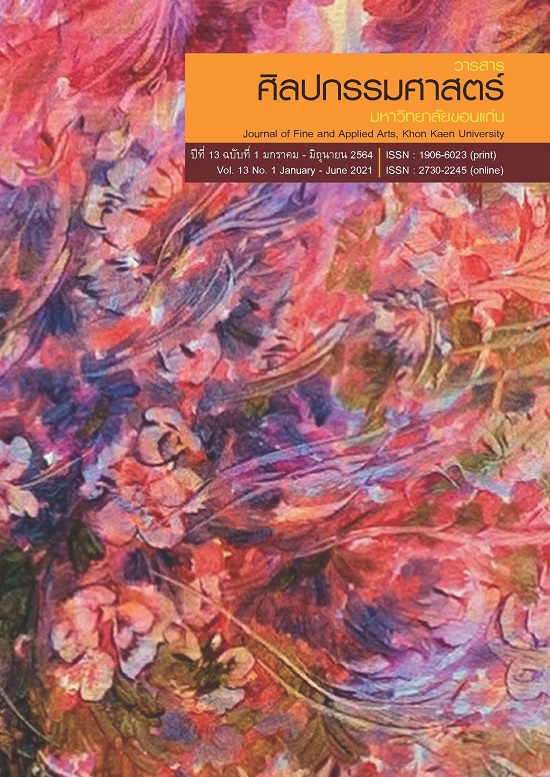Analysis the Creative Process of Charernjai Sundaravadin
Main Article Content
Abstract
Charernjai Sundaravadin national artist, the important and outstanding person of Thai Classical music industry especially Thai traditional singing. She is the disciple of Prayasanohdhuriyang (Cham Sundaravadin), whose father and the one who create and adjust Thai traditional singing from the past to be more fluent and melodious. Besides, she has learned both playing music instruments and singing from various famous teacher made she gained a plenty sources of knowledge that allowed her to created her own singing technique. I appreciate all that Charenjai Sundaravadin here done for Thai classical music industry. So, that is the reason why I pick the composition workings of Charenjai Sundaravadin up as the subject of my research. The workings that picked up to analyze are Jintaravatee tao, Phaya See Sao tao and Lob Roi Phlae Rak tao.
The main factor of her singing melody composition is the basic knowledge of the principle melodic which is the essence for making the full song. Also there are the other factors for example how to put the lyrics, word division, word placing, word distributing and proportionality in rhetoric formation. The rhetoric formation can divide into two form that is, go the same time with the last note of bar and go after the last note of bar. Furthermore, the principle melodic direction, the rhythm pattern and scale have to considered as well. From this research, it was found that the distinctive characteristics of Charanjai Sundaravada singing melody composition are the singing technique. The important technique can divide to three pattern that is three tone uttering, short two tone uttering and Sound tripping uttering. These technique appeared in both word uttering and melody uttering. In addition, there is also breathing proportion that she had placed beautifully.
This Jintaravatee tao, Phaya See Sao tao and Lob Roi Phlae Rak tao's Charoenjai Sundaravadin singing melody composition research was completed according to the objectives.
Article Details
Content and information in articles published in the Journal of Fine and Applied Arts of Khon Kaen University is regarded as the opinion and sole responsibility of the author(s) directly; therefore, editors are not obliged to agree to or share any responsibility with regard to the content and information that appears within these articles.
All articles, information, content, image, etc. that have been published in the Journal of Fine and Applied Arts of Khon Kaen University is the copyright of the Journal of Fine and Appllied Arts of Khon Kaen University. Any person or organization who wishes to distribute all or parts of the articles for further dissemination or other usage must first receive permission from the Journal of Fine and Applied Arts of Khon Kaen University before proceeding to do so.
References
จตุพร สีม่วง. (2554). เอกสารประกอบการสอนวิชาประพันธ์เพลงไทย. ขอนแก่น : คลังนานาวิทยา.
จตุพร สีม่วง. (2558). คู่มือการขับร้องเพลงไทยขั้นพื้นฐาน. ขอนแก่น : คลังนานาวิทยา.
เจริญใจ สุนทรวาทิน. (2538). หลักและวิธีการขับร้อง. ใน สายเสนาะ: ที่รฦกงานฉลองอายุ 80 ปีอาจารย์เจริญใจ สุนทรวาทิน 16 กันยายน 2538. (หน้า 150-157). กรุงเทพฯ : ธนาคารกสิกรไทย.
ดุษฎี สว่างวิบูลย์พงศ์, และชญานุตม์ อินทุดม. (2558). ศตสมัย เจริญใจ สุนทรวาทิน. กรุงเทพฯ : โรงพิมพ์ธนาคารกสิกรไทย.
บัณฑูร ล่ำซำ. (2555). บรรณานุสรณ์ เจริญใจ สุนทรวาทิน พ.ศ. 2555. กรุงเทพฯ : โรงพิมพ์ธนาคารกสิกรไทย.
พิชิต ชัยเสรี. (2559). สังคีตลักษณ์วิเคราะห์ (ดุริยางค์). กรุงเทพฯ : สำนักพิมพ์จุฬาลงกรณ์มหาวิทยาลัย.
มติชนออนไลน์. (2559). งานเพลงหมอวราห์. ค้นเมื่อ 20 มกราคม 2562, จาก https://www.matichon.co.th/ matichon/view_news.php?newsid=01fun03100759§ionid=0140&day=2016-07-10
ราชบัณฑิตสถาน. (2526). พจนานุกรมฉบับราชบัณฑิตสถาน พุทธศักราช 2526. พิมพ์ครั้งที่ 2. กรุงเทพฯ : อักษรเจริญพัฒน์.
ศิรินยา อินยา. (2556). การสืบทอดการขับร้องสายพระยาเสนาะดุริยางค์ (แช่มสุนทรวาทิน). วิทยานิพนธ์ปริญญาศิลปกรรมศาสตรบัณฑิต สาขาดนตรีไทย คณะศิลปกรรมศาสตร์ จุฬาลงกรณ์มหาวิทยาลัย.
สงัด ภูเขาทอง.(2532). ดนตรีไทยและทางเดินเข้าสู่ดนตรีไทย. กรุงเทพมหานคร: โรงพิมพ์เรือนแก้ว
สถาพร วางขุนทด. (2549). วิเคราะห์การขับร้องเพลงทยอยในและทยอยเขมรอัตราสามชั้น ทางอาจารย์เจริญใจ สุนทรวาทิน. วิทยานิพนธ์ปริญญาศิลปกรรมศาสตรบัณฑิต สาขาดนตรีไทย คณะศิลปกรรมศาสตร์ จุฬาลงกรณ์มหาวิทยาลัย.


